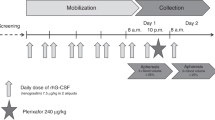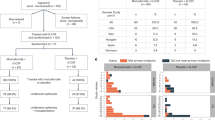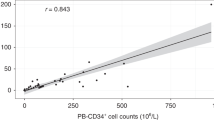Abstract
Granulocyte colony-stimulating factor (G-CSF) is considered to play a pivotal role in hemopoietic regulation. Its pharmacological application is reported to shorten chemotherapy-induced neutropenia as well as time to engraftment in patients after bone marrow transplantation (BMT). In order possibly to establish further rationale for G-CSF treatment strategies in patients undergoing BMT, we evaluated G-CSF plasma levels of 89 patients after allogeneic BMT for chronic myeloid leukemia (CML). EDTA anti-coagulated plasma samples were collected starting on day −1 (before grafting) and thereafter twice weekly for four consecutive weeks. G-CSF levels were estimated by enzyme immunoassay. Patients with late (>30 days) bone marrow engraftment had consistently higher G-CSF levels at day +1 (after grafting) compared to patients with early (⩽30 days) engraftment, while all patients had low plasma levels on day −1/0. Mean G-CSF plasma levels and time to engraftment were correlated (r = 0.79). In univariate analyses, high G-CSF levels at days +1, +4, +7, +10 and several clinical variables (such as TBI, unrelated donor transplant, state of disease) were predictive of late engraftment. Further analysis by multivariate Cox regression resulted in the following predictive model: high G-CSF plasma levels at day +7 and +10 (after grafting), in combination with a blastic phase of the disease were highly predictive of late engraftment. The significantly higher G-CSF levels in patients with impaired engraftment may reflect early compensating mechanisms of the hemopoietic system, which should be investigated further.
This is a preview of subscription content, access via your institution
Access options
Subscribe to this journal
Receive 12 print issues and online access
$259.00 per year
only $21.58 per issue
Buy this article
- Purchase on Springer Link
- Instant access to full article PDF
Prices may be subject to local taxes which are calculated during checkout
Similar content being viewed by others
Author information
Authors and Affiliations
Rights and permissions
About this article
Cite this article
Busch, F., Pilgrim, T., Krämer, A. et al. Plasma levels of granulocyte colony-stimulating factor in patients after allogeneic bone marrow transplantation for chronic myeloid leukemia correlate with engraftment of transplanted marrow. Bone Marrow Transplant 19, 653–659 (1997). https://doi.org/10.1038/sj.bmt.1700722
Received:
Accepted:
Issue Date:
DOI: https://doi.org/10.1038/sj.bmt.1700722
Keywords
This article is cited by
-
Increased expression of fibroblast growth factor receptor 3 in CD34+ BCR-ABL+ cells from patients with chronic myeloid leukemia
Leukemia (2003)
-
Adverse side-effects associated with G-CSF in patients with chronic myeloid leukemia undergoing allogeneic peripheral blood stem cell transplantation
Bone Marrow Transplantation (2000)
-
Flow cytometric detection of growth factor receptors in autografts and analysis of growth factor concentrations in autologous stem cell transplantation: possible significance for platelet recovery
Bone Marrow Transplantation (2000)



